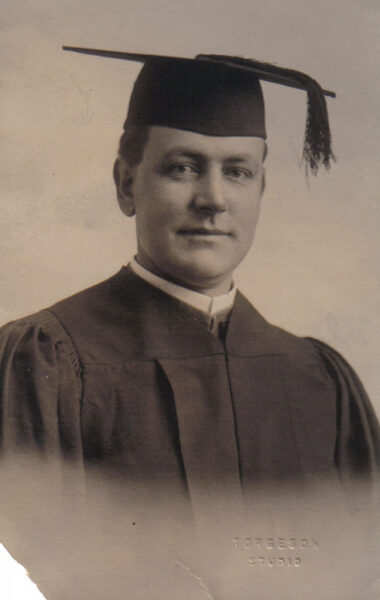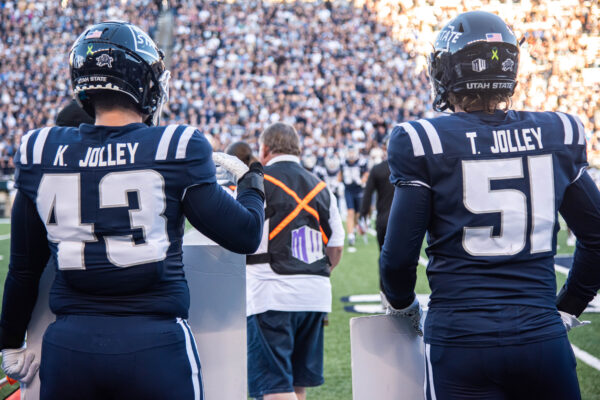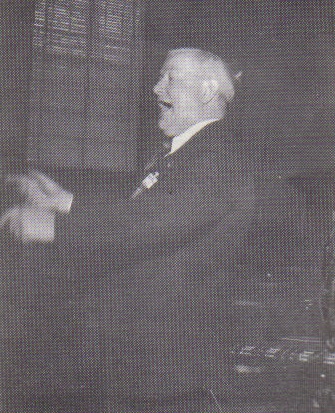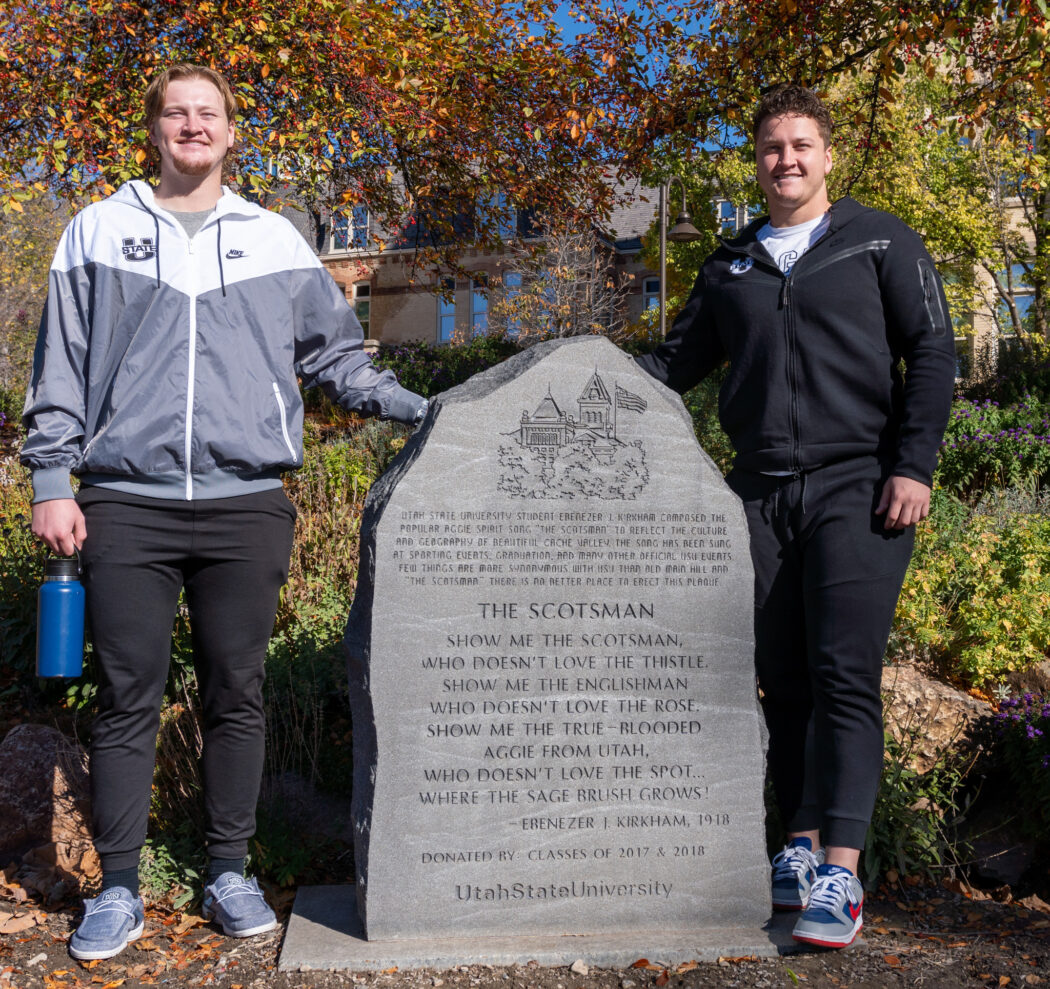A family legacy from Kirkham to the Jolley brothers
It is sung at every sporting event before the game starts and when the game ends, win or lose. It’s a symbol of school spirit and years of dedication to the Aggie community. Sounds of “The Scotsman” are heard throughout the stadium as athletes, students and fans sing along to the historic melody.
Ebenezer John Kirkham wrote The Scotsman as a Utah State University student in 1918 as an anthem for Aggie pride. Over 100 years later, his great-great-grandsons are on the same grounds playing football for USU.
 Jolley family
Jolley family Ebenezer J. Kirkham graduation photo at Utah State University in 1918.
Junior defensive end Kaden and freshman defensive lineman Tanner Jolley chose to walk on to the USU football team because of their rich family history here.
“It just feels like home. A home away from home,” Tanner said. “I think the Jolley blood is just attracted to Logan, Utah.”
Their parents, Tyler and Jeena Jolley, attended USU along with numerous other family members. Their grandfather played USU baseball in the 1960s and coached football at Logan High School. Having a rich family connection at the school has made the experience more meaningful for the brothers and their parents.
“I just feel a deep-seated connectedness and a love towards my family and how grateful I am to just have a family,” Tanner said. “It’s certainly something just amazing that you can’t really replicate anywhere else, and I’m just super grateful to have the opportunity to even just stand on the sidelines.”
The two brothers grew up in Grand Junction, Colorado and attended Fruita Monument High School, where they excelled on the field.
After high school, Kaden served a mission for The Church of Jesus Christ of Latter-day Saints in Barranquilla, Colombia. Upon his return, he enrolled in USU without having a spot on the football team. Halfway through Kaden’s first year, Tanner was a junior in high school, and the two went through the recruiting process together.
“I was never totally sure I wanted to play football in college,” Kaden said. “We were trying to get walk-on spots at Utah State, and we were going back and forth with some of the coaches, and the director of player personnel at the time gave Tanner preferred walk-on. After fall camp, I was able to join the team. but getting there was like shellshock because it’s so different from high school, and it had been like three years since I’d even thought about football.”
The adjustment after the time off was a challenge for Kaden and at times, discouraging.
“I’m very grateful Heavenly Father gave me the opportunity to even walk on and experience this, even though, some days I’m less than grateful for it,” Kaden said. “I always remind myself that this is what I wanted. I wouldn’t change it for anything.”

Kaden and Tanner Jolley stand on the sideline at Maverik Stadium on Oct. 7.
Tanner also served as a missionary in Salt Lake City after high school. Since his USU commitment happened in high school, he started with the team less than a week after returning home.
“I only had like five days before football practice started after my mission, and I certainly think the adjustment could have been a lot harder, but I think God was helping me out,” Tanner said. “He blessed me to be able to just have some strength in my body after not really working out super hard for two years and being able to get back into it fairly quickly. It’s certainly a lot more intense than high school football.”
He has been home for four months now and believes he’s a better player because of his religious service. He, along with Kaden, credit their collegiate football career to their mom — or “momager.”
“She’s always supported me and my brother and everybody, and she always pushes us to just be the best we can be,” Tanner said. “Being here is just like, kind of a little kid’s dream come true, and that’s all due to just my mom helping me out. Without her, I literally wouldn’t have been able to do anything.”
Tanner explained the process of getting recruited is like a “game.” He said even if you’re good, you won’t get recruited without knowing what the coaches want and playing the recruitment game. Once Kaden and Tanner decided to try for a walk-on, their mom was their No. 1 supporter. They said she learned how to play the game.
“First off, I want to say I love my mom. She’s like our football manager, but she’s our mom,” Kaden said. “She calls herself the momager because, without her, we would not have been able to get any walk or preferred walk-on. She was the reason why we got here.”
Jeena helped organize camps and meetings with coaches, check emails, respond to offers and even help run their Twitter accounts. The two said she helped them because she believed in them and their family legacy.
The most notable member in their family tree, great-great-grandpa Kirkham, remains in their hearts every time they step on the field.
“He loved singing and everything to do with it,” Tanner said. “He would gather groups of people and just start singing. And I guess that’s what kind of inspired him to want to make his own song and to lead people.”
Kirkham was born in 1885 in Lehi. His mother died when he was five years, old and he was raised working with his father. Ebenezer Beesley, a famous pioneer musician, went to Lehi to teach music and recognized Kirkham’s musical talents. Kirkham, his father and his brothers formed a pioneer band that traveled all over Utah to sing and play for people.
He later attended a year of school at Brigham Young University before going on a mission in Switzerland and Germany where he “sang his way into many homes.” At one point, he was imprisoned for preaching and used his musical talents to befriend the guards. He was released just three days later.
Kirkham noted in his journal, “I was the happiest prisoner Chur ever had or ever will have.”
After his mission, Kirkham received a degree in agronomy from the Utah State Agricultural College. He participated in the college quartet, glee club, was a song leader and more. Most memorable, he composed the Aggie rally song.
“People are so fond of it, not just that he wrote it, but the people like really, really love it. It really makes you feel the Aggie proud,” Kaden said. “It is incredibly special and it does add an extra element. I think football in the Mav would be special regardless, but it just adds a little extra cherry on top that our great-great-grandfather wrote the song that we sing at everything.”
Kirkham performed The Scotsman at countless sporting events during his time at USU. After he had graduated, he continued to perform as an alumnus and sang other songs throughout Utah.
Tyler grew up hearing stories of Kirkham from his parents and grandparents.
“Great-grandpa Kirk, he would like kind of travel around the Wasatch Front singing with his dad and his brothers. He kind of always had music and singing,” Tyler said.
 Jolley family
Jolley family Ebenezer J. Kirkham directs a community singing group.
Tyler said after Kirkham graduated, he had a 46-year career selling life insurance. He would go door to door as a salesman and found a unique way to secure deals.
“When he would get to the door and open the door, he would sing The Scotsman, especially around Cache Valley and the Wasatch Front. People just thought that was so charming, they would buy insurance from him,” Tyler said.
That charm took him far, with Kirkham becoming one of New York Life Insurance’s best salesmen. They even rewarded him with a solid gold ring engraved with a crest, all because he entered the hearts and homes of locals who cherished the school song.
From Kirkham writing The Scotsman to Kaden and Tanner playing in Maverik Stadium, the Jolley family legacy lives on at USU.
“Who would have ever thought that great-grandpa Kirk stood in a similar stadium as us? It’s pretty nuts to see how it’s full circle,” Tyler said. “He was there to get the crowd pumped and he was always at all those games. One hundred years later, here we are going to those games and watching the boys. I’m grateful for the football team and the coaches to just allow them to be on the team right now together.”
The Scotsman lives on, as does Kirkham’s spirit.
“It’s just amazing,” Tanner said. “As they sing The Scotsman, I listen to it and I can’t help but feel connected to my great-great grandfather that I never really knew.”

